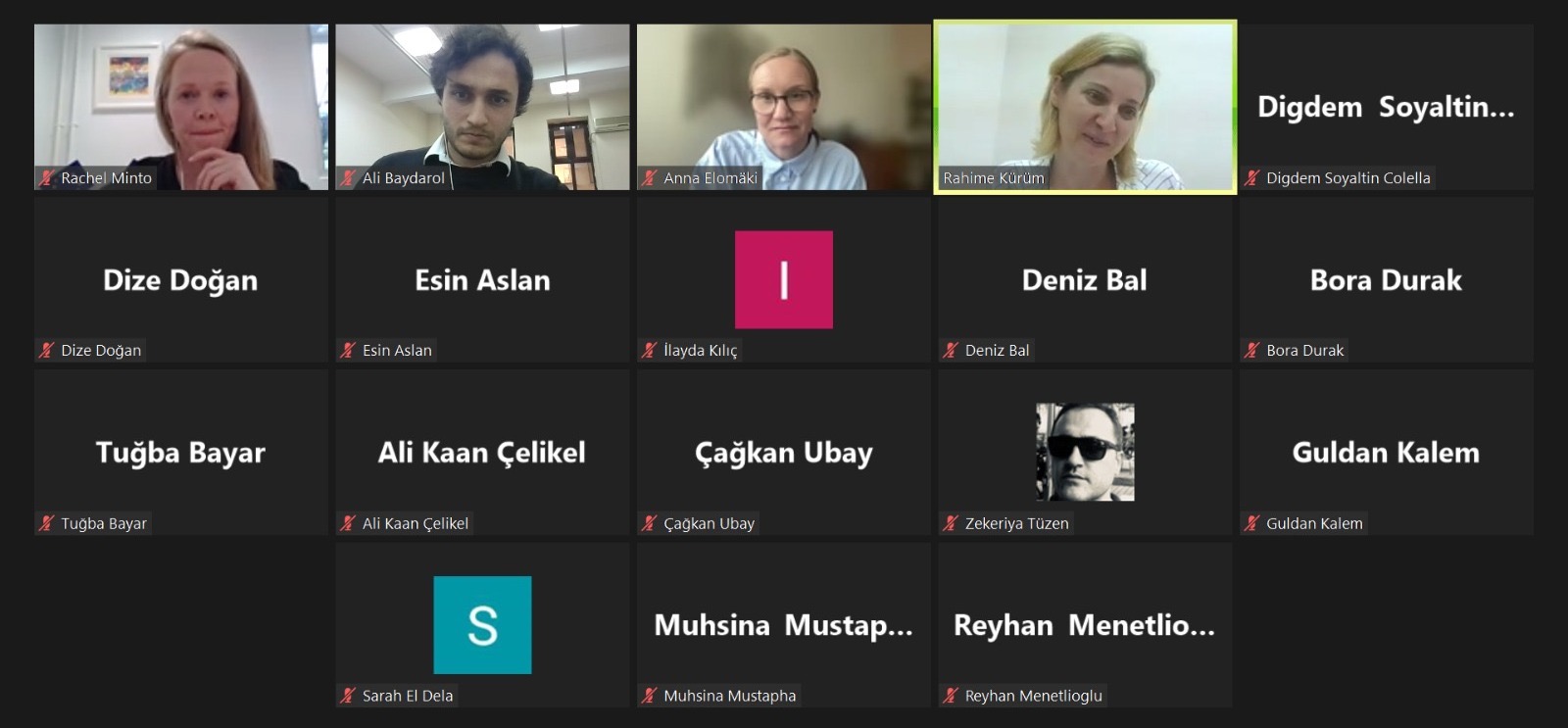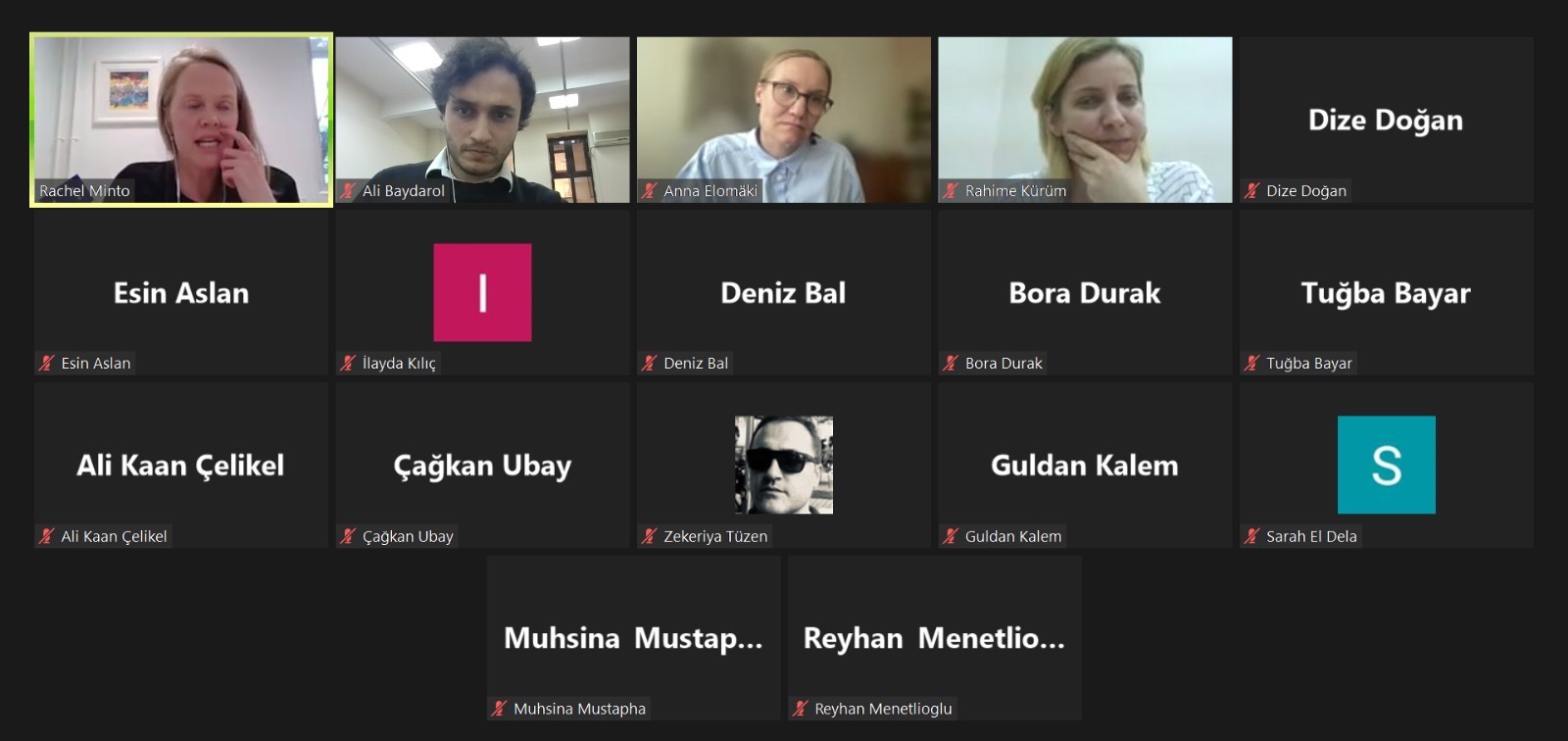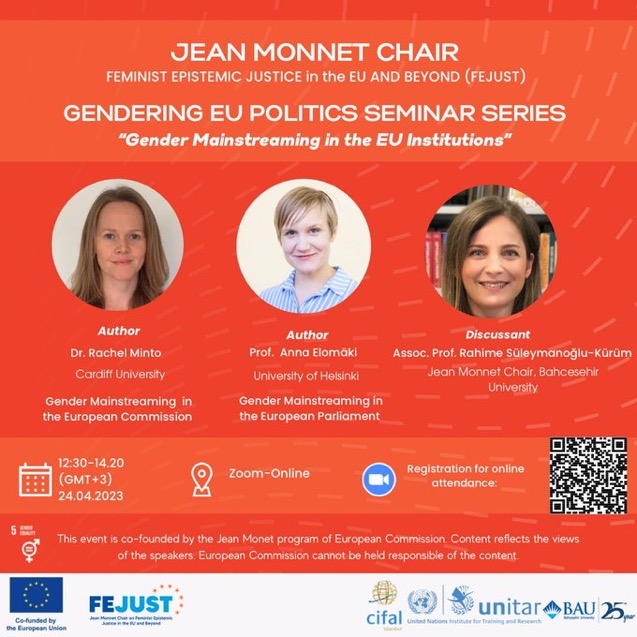Gendering EU Politics Seminar 3
Title: Gender Mainstreaming in the EU Institutions
Date: 24 April 2023
Speakers: Dr. Rachel Minto (Cardiff University) and Dr. Anna Elomäki (University of Helsinki)
Moderator: Rahime Süleymanoğlu-Kürüm, Jean Monnet Chair, BAU
The third seminar in the Gendering EU Politics series brought together two leading scholars, Dr. Rachel Minto and Dr. Anna Elomäki, to discuss the institutionalization of gender mainstreaming within two of the EU’s primary institutions—the European Commission and the European Parliament. The seminar provided a comprehensive overview of the challenges and opportunities for embedding gender equality in EU policymaking processes, emphasizing the need for transformative approaches to tackle structural inequalities.
About the Speakers:
Dr. Rachel Minto is a Senior Lecturer in Politics at Cardiff University with a background in EU politics and governance, and a particular interest in agender equality and territorial politics. She is particularly interested in the strategy “gender mainstreaming” and how it can be used to promote substantive equality between women and men through institutionalising change at a structural level. More recently, her work has explored the concepts of Europeanisation and de-Europeanisation, and how these play out differently in the four nations of the UK both pre- and post-Brexit, with particular attention to gender equality governance. Dr Minto is actively involved in gender equality activity beyond academia. She is a Trustee of the recently established Wales Women’s Budget Group and one of the coordinators of the Women in Europe (Wales) network, which sits as part of the Senedd’s Cross-Party Group on Women. She is also a member of the Gender Network, which is linked to Welsh Government's Third Sector Partnership Council. All of this activity beyond academic draws from and serves to disseminate her feminist research experience.
Dr. Anna Elomäki is Academy of Finland Research Fellow at Tampere University, Finland. She obtained her PhD in Gender Studies in 2012. Her research focuses on the interconnections between the economy, politics and gender in Finland and at the EU level, and on EU integration with a focus on gender equality policies and economic governance. She has studied, among other things, gender mainstreaming and gender budgeting, economisation and neoliberalization of gender equality policy, gendered impacts and practices of economic policy-making. Her current research project focuses on the implementation of EU economic governance in member states from the perspective of gender equality and democracy. Dr. Elomäki regularly engages with consultancy work for different EU institutions and Finnish government administration and has seeks to bring gender perspectives in economic policy debates at national and EU levels. She has published widely in key international journals in the fields of political science, gender studies and social policy. Her co-edited books include European Parliament’s Political Groups in Turbulent Times (Palgrave, 2022, with Petra Ahrens and Johanna Kantola) and Social Partners and Gender Equality: Change and Continuity in Gendered Corporatism in Europe (Palgrave 2022; with Johanna Kantola and Paula Koskinen Sandberg).
Overview of Presentations
Dr. Rachel Minto explored gender mainstreaming within the European Commission, the EU's executive body and the institution with the sole right to propose legislation. She traced the history of gender mainstreaming since its adoption by the EU in the 1990s, highlighting its potential as a transformative equality strategy aimed at addressing structural inequalities across systems, policies, and practices.
Using a comprehensive framework developed in collaboration with colleagues, Dr. Minto assessed the institutionalization of gender mainstreaming within the Commission. Her analysis focused on five dimensions: formal adoption, structures and procedures, quality, accountability, and stability. While she acknowledged recent progress under Ursula von der Leyen’s leadership—such as achieving gender balance within the College of Commissioners and appointing Helena Dalli as the first Commissioner for Equality—she argued that gender mainstreaming remains weakly institutionalized in the Commission.
Key findings from her research included:
•Weak structures and procedures: Despite the creation of equality-focused bodies, gender mainstreaming remains marginal, with a lack of clear guidelines and integration within overarching frameworks like the Better Regulation agenda.
•Limited accountability: Opaque decision-making processes and a lack of enforcement mechanisms hinder the effective implementation of gender mainstreaming initiatives.
•Promising developments: New initiatives, such as the Task Force on Equality, show potential for institutional change, but their long-term impact depends on sustained political commitment and structural reforms.
Dr. Minto concluded with recommendations for strengthening gender mainstreaming in the European Commission, emphasizing the need for formalized ownership, enforcement mechanisms, capacity building, and transformative approaches that integrate gender equality across all policy domains.
Dr. Anna Elomäki shifted the focus to the European Parliament, highlighting its dual role as a co-legislator and an institution with the capacity to advance gender mainstreaming through its internal operations. Unlike the Commission, the European Parliament has a formal gender mainstreaming strategy in place, operationalized through its Committee on Women’s Rights and Gender Equality (FEMM Committee).
Dr. Elomäki outlined the Parliament’s mechanisms for incorporating gender perspectives into legislation, such as amending directives, shaping funding regulations, and initiating gender-focused reports. She provided examples of successful gender mainstreaming efforts, including amendments to the Recovery and Resilience Facility and the Technical Support Instrument, which incorporated gender equality provisions due to the Parliament’s advocacy.
However, she also identified barriers to effective gender mainstreaming in the Parliament:
•Political divisions: Ideological differences between political groups significantly impact gender mainstreaming efforts. While progressive groups such as the Greens and the Left support gender equality initiatives, conservative and far-right groups often oppose them.
•Committee hierarchies: The FEMM Committee, despite its role in coordinating gender mainstreaming, struggles to influence higher-ranking committees, particularly those focused on economic policies.
•Cultural resistance: Informal norms within certain committees and political groups perpetuate patriarchal attitudes, creating obstacles for gender equality advocates.
Dr. Elomäki emphasized the importance of cross-party networks in advancing gender mainstreaming and called for greater engagement with political groups to ensure gender perspectives are integrated across all areas of parliamentary work.
This seminar highlighted the importance of feminist epistemic justice in advancing gender equality within EU institutions. Both speakers emphasized the need for structural and cultural change to address the androcentric norms embedded in EU policymaking. By advocating for greater inclusivity, accountability, and transformative approaches, the seminar reinforced the critical role of feminist scholarship in reshaping institutional frameworks and promoting equity.
The event attracted 57 participants from a diverse audience of academics, students, and practitioners, who participated in a vibrant Q&A session. The event Topics included the impact of political leadership on gender mainstreaming, the role of informal norms and networks, and the challenges posed by rising anti-gender movements in member states. Participants praised the speakers’ research for offering practical insights into the complexities of gender mainstreaming within the EU and its potential to transform policymaking processes.
Click here for seminar recording.


